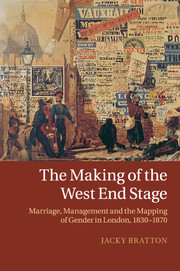 The Making of the West End Stage
The Making of the West End Stage Chapter 2 - The Era: hierarchies, seriousness and the organ of the profession
from Part I - Mapping
Published online by Cambridge University Press: 05 November 2011
Summary
Introduction: some are more equal than others
Having rejected the hostile characterisation of mid-century entertainment generated and transmitted by contemporary intellectual and subsequent academic critique, and adopted instead the practical strategy of walking the city streets in the wake of less pretentious Victorian pleasure seekers and journalists, the previous chapter concluded that the essence of the West End was not to be comprehended on the ground. It is not simply a site, but a complex text; its existence is discursive, and a key, a lexicon of that discourse is required. This chapter, therefore, turns once more to the Victorian press, but endeavours this time to understand it as a guide to pleasure and leisure through its articulation of self and culture, by means of one of its own major analytical and taxonomic tools: the notion of class.
In 1878 Matthew Arnold, by then a senior public figure, a noted social and religious critic as well as an established poet, lectured on the subject of ‘Equality’, which he assumed his auditors would regard as a chimera pursued only by the French and the otherwise misguided. His argument in its favour rests upon his characterisation of English class society, in a taxonomy he had refined upon since his description of the ‘Philistines’ and ‘Barbarians’ in Culture and Anarchy in 1869. The published version of the lecture appeared in the intellectual journal The Fortnightly Review, and it includes the following passages:
our middle class divides itself into a serious portion, and a gay or rowdy portion . . . With the gay or rowdy portion we need not much concern ourselves; we shall figure it to our minds sufficiently if we conceive it as the source of that war-song produced in these recent days of excitement –
‘We don't want to fight, but by jingo, if we do,
We've got the ships, we've got the men, and we've got the money too.’
We may also partly judge its standard of life, and the needs of its nature, by the modern English theatre, perhaps the most contemptible in Europe. But the real strength of the English middle class is in its serious portion.
- Type
- Chapter
- Information
- The Making of the West End StageMarriage, Management and the Mapping of Gender in London, 1830–1870, pp. 46 - 85Publisher: Cambridge University PressPrint publication year: 2011


